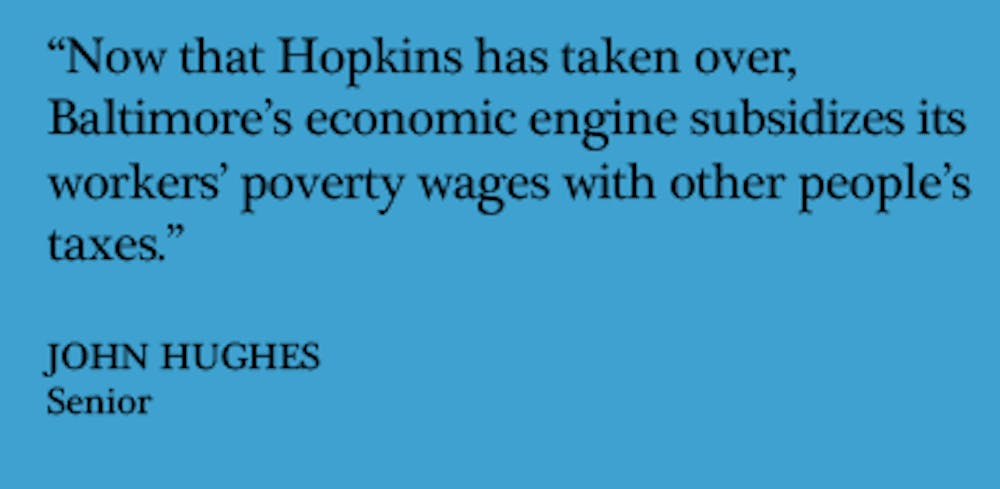For the majority of the 20th century, Hopkins was not the primary economic engine of Baltimore City. That title belonged to a massive steel mill whose workers were part of a strong union, operating out of Sparrows Point in southeast Baltimore — Bethlehem Steel’s Baltimore plant. Up until its decline in the ‘70s and ‘80s, the mill was the crown jewel of an industrial Baltimore, perfectly positioned in a major port and railroad hub in the middle of the eastern shore.
The substantial wages earned by its workers were spent and saved, growing the economy and producing much of the generational wealth held by the (predominantly white) children and grandchildren of these workers living in the City and surrounding suburbs today. I am among these beneficiaries; my grandfather worked at the mill, and while a steelworker’s savings and pension will not make his family rich, they will make it financially stable and able to weather emergencies, stable enough for his grandchildren to attend well-maintained public schools without needing to get their own side jobs, to devote their time to the studying needed to get into schools like Hopkins. If the era of Bethlehem Steel had not also been the era of segregation and redlining, had these benefits been shared with all of the City’s working class, Baltimore would look very different today.
As this money grew the economy, it was taxed and grew city infrastructure. Bethlehem Steel workers lived in Baltimore City, and paid city income and sales taxes. The mill also paid property tax on its port-adjacent land and tax on the sale of steel.
But Bethlehem Steel no longer exists; Hopkins is now the City’s economic engine. The number one and number two private employers in Baltimore City are Hopkins and Hopkins Medical Institutions, with a combined 34,000 employees. (At its peak, Bethlehem employed 30,000 in Baltimore.) We’re doing a damn terrible job at running Baltimore’s economy. Because we’re not trying to — we’re trying to run the Hopkins economy, while ignoring Baltimore.
Hopkins is rapidly approaching being a $10 billion industry all on its own; in 2015, our net assets were $9.020 billion, while our net liabilities were $5.615 billion. In the same year we owned over a third of a billion dollars in real estate alone.
But the City can no longer tax most of this money. It can’t collect taxes on the property because we’re nonprofit, nor can it collect on our principal revenue streams: untaxed tuition, research grants and medical billing, plus federally/state taxed capital gains. All that remains is income and sales tax. But Hopkins employees making enough to pay income tax overwhelmingly live in Baltimore County, which receives their income tax and most of their sales tax. (The division of County and City is a unique arrangement, one shared by almost no other American city. It is, unsurprisingly, a product of segregation, which it continues to reinforce.)
Most of the employees living in the City aren’t making enough to pay income tax, nor are they making enough to pay rent and buy food. When Hopkins Hospital workers unsuccessfully struck for $15 an hour in 2014, 70 percent of the workers qualified for food stamps and 25 percent had incomes below the poverty line, assuming typical family arrangements. We pay our employees so little that they must take from the City’s welfare pot in order to survive.
Once, Baltimore’s economic engine paid taxes, plus high wages and substantial benefits, feeding into the infrastructure that this economy ran on. Now that Hopkins has taken over, Baltimore’s economic engine subsidizes its workers’ poverty wages with other people’s taxes. Meanwhile, our white collar employees reap the benefits of this arrangement and pump them into the County, old money neighborhoods like Hampden and Roland Park, or gentrifying neighborhoods like Remington and Federal Hill.
This cannot continue. Unless labor stands up to extract wealth-growing wages from Hopkins and unless the City gets its priorities straight and demands state legislation allowing it to tax Hopkins’ revenue, land and wages, Baltimore will fall into ruin as it is pillaged by the University, and every claim by Hopkins to be giving back to Baltimore will be nonsense.
John Hughes is a senior BS/MS student in Electrical Engineering from Baltimore, Md.





